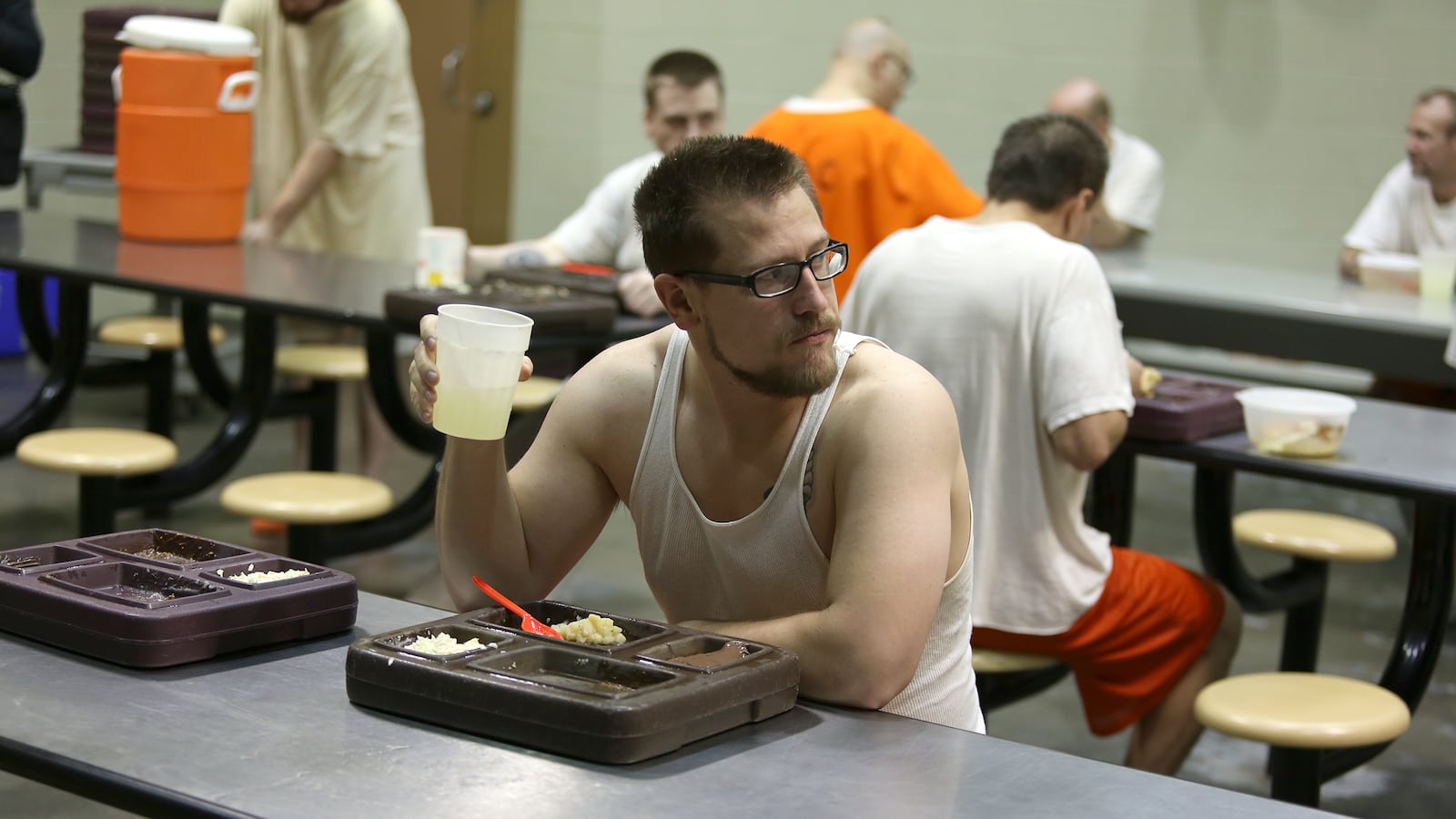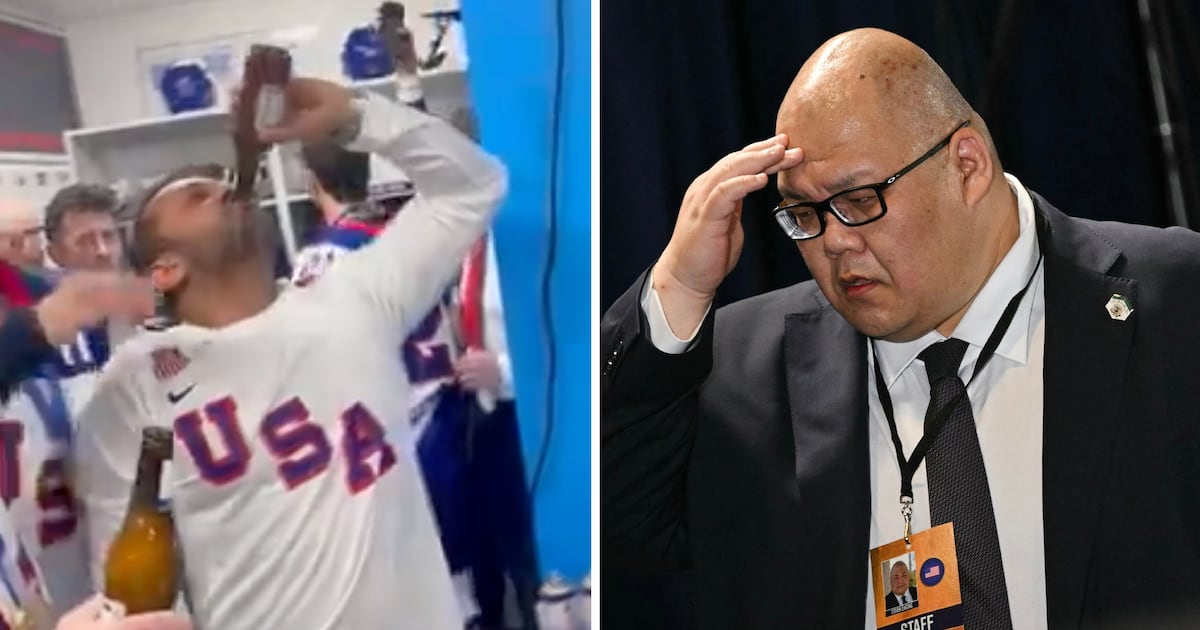It’s always taken a certain alchemy of bravery and brio to even desire to become a reality TV star, but A&E Networks changed the otherwise glam reality game with some of realitydom’s most harrowingly human setups: real people sharing tough stories. Hoarders. Intervention. Goddamn Duck Dynasty.
Their latest docuseries 60 Days In treads such stomach-churning ground that, at times, you truly wonder if all seven of the average civilians who signed up to spend two months in a county jail—for (social) science and, y’know, ratings—will make it home in one piece.
The 12-episode series follows an “unprecedented” prison reform program conceived by Clark County, Indiana, Sheriff Jamey Noel, a ruddy-cheeked, stocky man who landed the sheriff’s gig only to find he inherited a county jail rotted through by corruption and extreme anarchy.
“Before I took office… the inmates were running the facility,” he tells the camera, posing for a glossy stand-up shot that gives 60 Days In an unfortunate sheen of opportunistic slime. “People were getting arrested on purpose because drugs were cheaper to get in jail,” he says, while security footage from the compound’s 300 cameras cut through scenes of violent cellblock brawls and shockingly conspicuous drug use.
Noel says he staged raids to sweep narcotics out of his jail, but the problems persisted. He suspected both inmates and guards were in cahoots moving contraband throughout an invisible network he couldn’t reach. So he came up with a LEGITIMATELY INSANE IDEA: Why not recruit normal, law-abiding citizens to go undercover in this very dangerous prison rife with drugs, violence, and lawlessness and have them operate as informants?
Why not? Oh, maybe the extraordinary liability of possible harm coming to any of Noel’s civilian moles deep undercover in the clink? 60 Days In raises the question immediately: What kind of person would sign up to take such a risk?
Pretty average upstanding Americans, it turns out. The septet of innocent citizens in the show hail from diverse backgrounds, each with their own honorable reasons for signing on. There’s Zac, a former Marine who hopes the experience helps him land a job with the DEA—so much so that he leaves his wife and baby back home to join the program. Tami, a 20-year veteran police officer, also has a wife and daughter waiting for her but is driven by a foster home upbringing to understand how the other half lives behind bars.
After the first two episodes, which debut back-to-back this Thursday, it seems likely at least a few of these incognito prison test subjects will not be escaping bodily harm or worse after 60 days in the shit. Not that they seem to understand what’s at stake as the premiere episode unfurls.
With the exception of the sheriff who came up with this brilliant idea to clean up his jail, one overseeing officer on the ground, and the show’s producers who moonlight as a documentary film crew, nobody has knowledge of this secret program. Not even the guards, who may or may not also be dirty themselves, know that these newbie criminals are actually completely unprepared normal persons who have been cast—I mean, recruited—to serve as state informants.
The first episode is structured much like any reality competition show. We meet the “characters,” see their webcam audition tapes, make a home visit or two with the adoring families who don’t quite understand why their loved one has gone off the deep end for a television show—but support them nonetheless.
Also mind-blowing is the fact that, although given fake arrest and conviction records, they’re instructed to go by their real identities—with the exception of one woman who has a pretty great reason for using an alias: She’s the daughter of Muhammad Ali. “If my father didn’t have Parkinson’s and was bright, he wouldn’t go for this!” Maryum Ali, a social worker by trade, laughs to the camera while still a free woman.
These seven fake inmates undergo “training”—if that’s what you can call a few days sitting in a classroom, learning from burly professionals how not to be made as a rat in jail, who not to piss off, what not to do AT ALL COSTS in order to avoid being labeled a snitch. For example, Prison Economics 101, or how to spend money without borrowing from the wrong people. How not to let anyone steal too much of your food, otherwise “they’re gonna think you’re a bitch.” Don’t intervene in prison fights. Don’t break the law. Don’t hide in your cell too much. Don’t go outside your cell too much. Whatever you do, don’t blow your cover.

Nervously scratching his head through all of this is Jeff, a professional “security officer” who worries about defending himself if attacked. Blond, bespectacled, and of a gently doughy build, he’s doing the program to prove he can make it as a bona fide correctional officer and graduate from his position as a mall cop back home in Iowa.
“He,” a colleague who has seen the show declared with a grim sigh, “is going to die.”
It’s worth noting that, technically speaking, snitching is what these reality show participants are being paid to do—willingly move into a volatile county jail with virtually no safety net or protections in place in order to observe the crime and corruption that may be taking place in the shadows.
That said, it’s riveting stuff once the charade gets going. Call it Undercover Inmate. Once in the slammer where they’re forced to trade their street clothes for prison orange and leave the world they know behind, it starts to get real for everyone involved. One participant gets a little too cozy with the pod boss who runs their cellblock like a mini fiefdom, worrying the prison admins who are discreetly monitoring their lab rats from afar.
Another participant, a schoolteacher named Robert, inspires the most concern right off the bat. From episode 1 he’s conspicuously flippant about the risks at hand, comparing the prison system to a country club where inmates get to lie around watching television all day on the government’s dime. When Robert finally saunters into his jail pod his condescension lands him in a precarious position, painting a giant target on his back that slick editing suggests leads directly to a violent encounter.
The moral complications of this precarious setup escalate quickly, augmented by a dramatically throbbing score. It’s a mutually beneficial arrangement for Sheriff Noel, whose gamble could pay off with huge exposure for his maverick brand of prison reform, and for the producers, who can blame the program if anything goes horribly wrong. More questionable is what the seven participants will have gained when their time on the show is up, for by the end of episode 2, hidden cameras capture suspicious inmates plotting nefarious deeds.
Is it any wonder A&E just green-lit a second season?






